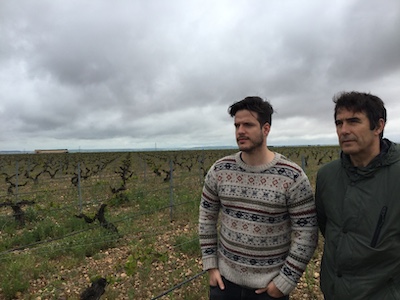Cantalapiedra Viticultores
Carretera VP-9901, km 4. 47491 La Seca (Valladolid)
cantalapiedraviticultores.com
Several generations of the Cantalapiedra family have farmed vines in the Rueda region, but the foundations of this project were laid in 1949, when Heliodoro planted his own vineyard at the age of 15. His son Isaac continued his father's work as a grape grower until 2014, when, he and his son, Manuel, decided to establish their own winery focusing primarily on wines made from the Verdejo variety.
Initially, Isaac and Manuel started with just seven of the 20 hectares they owned in the village of La Seca (Valladolid), but they now vinify their entire harvest and have expanded with the purchase of additional vineyards in the area. Their plots, planted at an elevation of about 750 metres, feature diverse soils ranging from sandy-loam to clay-loam, with a limestone sublayer covered by the region's characteristic pebbles.
Committed to organic farming, they have also adopted biodynamic practices in both vineyard and winery, incorporating plant-based treatments such as nettles and horsetail infusions, indigenous yeasts and small amounts of sulphur. Their philosophy –prioritising vineyard expression with minimal intervention – led them to make their wines under the umbrella of Vino de la Tierra de Castilla instead of the Rueda appellation.
Their flagship wine, Cantayano, was the first they released in 2014. Named after Manuel's two surnames (Cantalpiedra Moyano), it is a 100% Verdejo sourced from several plots in La Seca. The wine (50,000 bottles, €12) ferments primarily in stainless steel (90%) with the remaining 10% in used barrels where it rests on its lees for eight months before being bottled unfiltered.
Majuelo del Chiviritero (formerly Chivitero, until a similarly named large bodega contested the brand, (7.300 bottles, €17.50) is another 100% Verdejo. It comes from a two-hectare vineyard named Chivitero planted in 1981 on a small plateau with abundant pebbles and relatively high clay content. It is harvested by hand -an uncommon practice in Rueda where the use of machines is widespread. After maceration and pressing, the must ferments for 45 days with its own yeasts and is aged with its lees, without batonnage, in used French oak barrels for one year plus another year in stainless steel tanks. The result is a serious, structured wine with added depth and complexity
Majuelo El Espejo (6,700 bottles, €36) comes from a neighbouring but very different site, –a hillside with fewer stones and shallower soils, resulting in wines with greater tension and length.
The jewel in the crown, La Otea (2,000 bottles, €54), comes from a pre-phylloxera plot in Villanueva del Duero, where vines grow on very poor sandy soils. With extremely low yields, it produces highly concentrated grapes with very low pH levels, resulting in a deep, complex expression of Verdejo.
Manuel, who likes to experiment with natural wines, also produces Mondo y Lirondo, two Verdejos made outside the main brand he shares with his father, as they take a more radical approach. These wines are neither filtered nor clarified, and no sulphur is added. Manuel describes Lirondo (70,000 bottles, €12) as a "Verdejo en rama". Grapes are sourced from a cousin whose vineyards are organically certified and it is fermented and aged in stainless steel tanks with its lees for eight months. Aged for a year in seasoned oak barrels, Mondo (3,000 bottles, €22) comes from a plot that Isaac planted with his father Heliodoro. To keep costs down, both wines feature a label designed by Manuel himself.
The winery also produces the red Arenisca (15.000 bottles, €15). It is 100% Tinta de Toro from Zamora, but as the wine is made in the cellar in La Seca, is outside the DO.
Most popular
NEWSLETTER
Join our community of Spanish wine lovers


